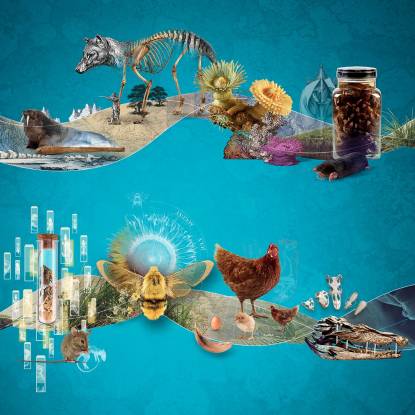Museums on Prescription shortlisted for Royal Society for Public Health Award
Have you ever heard the expression “Social Prescribing”? It’s the idea that our health and wellbeing can be improved by regular interaction with a community. Perhaps we feel we know this instinctively – who doesn’t feel better after seeing friends? - but when health factors render a patient house-bound, the potential for social isolation can increase, and both physical and mental health can deteriorate.
Helen Chatterjee, Professor of Biology at UCL Biosciences and Head of Research and Teaching at UCL Culture, has been working on a project that explores ways to remedy this decline using arts and cultural engagement, and now her work is up for a prestigious Royal Society for Public Health award.
Museums on Prescription is the three-year project led by Helen and run with academics from Canterbury Christ Church University. Together they have connected lonely older adults at risk of social isolation to partner museums in Central London and Kent. The project looked at ways in which arts and cultural activities, particularly in museums and galleries, could positively impact the lives of the participants. Referred by health, social care and third sector organisations, these participants took part in 10-week programmes of museum-based sessions consisting of tours, talks and creative activities inspired by the collections.

This project is reflective of a wider trend for using arts as therapy. The UK was in fact one of the first countries to support the value of arts in health and wellbeing, alongside Australia and Finland, publishing a major report that highlighted the importance of these schemes in 2014. This research found that creative activity has a positive effect on mental health. It increases self-esteem and improves quality of life. A range of conditions including anxiety, depression, phobia and eating disorders are positively influenced by creative engagement. Furthermore, the NHS and Social Care have been working to reduce the use of antipsychotic drugs for dementia by two-thirds using community-centred approaches, though it admits there is still much to do.
We hope that with more creatively engaging projects like Helen’s, that celebrate our wealth of museum treasures and the positive influence they can have, we’ll begin to see a changing landscape in the treatment of mental health and wellbeing.
Reference:
Chatterjee, H.J. and L. Thomson (2015) Museums and Social Prescribing, in H. L. Robertson (ed.) The Caring Museum: New Models of Engagement with Ageing, pp. 304-341. MuseumsEtc, Edinburgh and Boston.
The Museums on Prescription project was funded by the Arts and Humanities Research Council.
You can download a full press release of the project’s nomination for award here.
Read the full Arts & Health Journal post by Helen Chatterjee.
Further reading on museums and wellbeing can be found here.

 Close
Close



